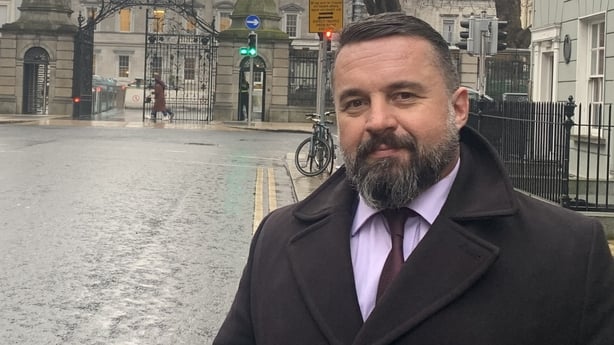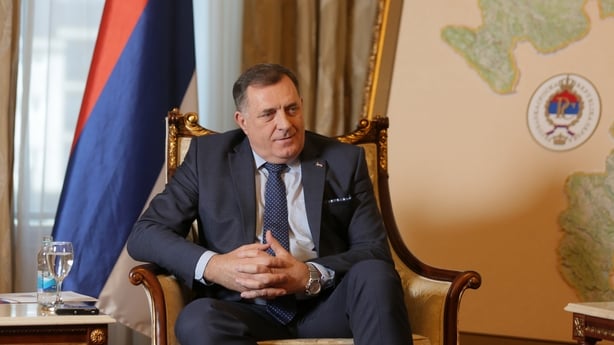The soft-spoken Bosnian Ambassador to Ireland, Vanja Filipovic, came to Dublin this week, from his London base, with a very worrying message.
As he shuttled between meetings with senior officials and politicians on Monday and Tuesday, he warned of the possible disintegration of his state and a return to violence.
It's a warning that the international community, and Ireland, should heed given the 1992-1995 war led to the deaths of more than 100,000 people.
The main concern relates to the words and actions of Milorad Dodik - a Serb nationalist leader in Bosnia.
Ambassador Filipovic says his rhetoric, and now political actions contain "... all the ingredients of a slow-motion secession".
Milorad Dodik is the President of what's called Republika Srpska - a political entity which is part of Bosnia and Herzegovina.
However, President Dodik is continually agitating to withdraw from federal institutions and arrangements created under the Dayton Peace Agreement - such as tax, defence, and judicial affairs.
Ambassador Filipovic argues that President Dodik's manoeuvres to create parallel institutions in Republika Srpska are not just illegal and unconstitutional, but preliminary moves to breaking-up the country.
He warns if Republika Srpska tries to unite with Serbia ... "it could have very, very negative consequences on the situation in Bosnia and ultimately lead to the renewal of some type of violence".

Dodik claims his only aim is to decentralise powers from the Federal level to the Bosnian Serb parliament.
He told lawmakers once: "Entities and their parliaments should have greater significance and role because they are a true source of democracy, legitimacy and responsibility in Bosnia Herzegovina. Bosnia Herzegovina is moving in a direction we do not agree with. We do not allow interference in our jurisdiction."
The problem with this analysis is that what Dodik terms "interference" is part of an international peace agreement, the country's constitution, and the rule of law.
Last month, President Dodik defied the courts yet again, and held an illegal military parade celebrating the day, in 1992, when Bosnian Serbs declared their own state.
It was provocative on many levels but especially because, while the army is a Federal responsibility, a quasi-paramilitary force was on parade.
Ambassador Filipovic said, for him, what was "most disturbing" about the event was not the display but "... the presence of a convicted war criminal who was directly in charge of one of the brigades involved in Srebrenica genocide".
That man was Vinko Pandurevic.
According to the International Criminal Tribunal on the former Yugoslavia, he was the commander of the Bosnian Serb Zvornik Brigade which "... was involved in the July 1995 attack on the Srebrenica safe area and the subsequent killing and execution of Bosnian Muslim men and boys".
Around 8,000 were slaughtered in a massacre lasting around ten days.
President Dodik himself downplays Srebrenica - once dismissing it as "a fabricated myth".
He also uses vile language to describe Bosnian Muslims, including branding them "second-rate people" and "treacherous converts" who sold their "original [Orthodox Christian] faith for dinner".
Ambassador Filipovic discerns a strategy in these repulsive actions.
He told me: "This is not only aimed at domestic political reasons, but it is also meant to sow further divisions in Bosnia in the hope that everybody will give up on this idea of reconciliation and tolerance."
The Ambassador predicts the plan will fail.
The problems being experienced in Bosnia are being watched closely by the wider region, and Milorad Dodik is not without support.

At his paramilitary parade last month, there were representatives from Serbia, as well as diplomats from Russia and China - his "true friends".
At EU level, Hungary has indicated it would block any move to impose sanctions on the President or his parliament.
Some nationalist parties in Croatia, with influence in Bosnia, are also accused of using the debacle to further their own agenda.
Ambassador Filipovic said: "They have been trying politically to garner support without much success. So, their only course of action is to try - jointly with Republika Srpska - to further their agenda. That's a very dangerous combination."
Part of the problem, the Ambassador contends, is that western nations have pulled back from engaging on Bosnia over the past decade.
That said, the US did slap sanctions on Dodik last month - claiming he was using his position as President to amass a personal fortune while trying to break-up Bosnia.
Treasury official Brian Nelson said: "Milorad Dodik's destabilising corrupt activities to dismantle the Dayton Peace Accords, motivated by his own self-interest, threaten the stability of Bosnia Herzegovina and the entire region."
Dodik's response was predictable: "If they think they will discipline me in this way, they are very wrong.
"I have now only got a motive to fight for the rights that have been taken away from us for 26 years."
What would help the atmosphere, says Ambassador Filipovic, is for the EU to be clear about the chances of Bosnia joining the EU.
He stated: "We really need a stronger EU engagement on the possibility of enlargement which is realistic ... which is not too vague ... which is not beset by moving goalposts for the candidate countries."
This is where Ireland fits in.
We have been, the Ambassador says, "a champion of enlargement" in the western Balkans.
"Ireland has an important voice as part of the EU. It can help us by making sure that the EU stays true to its own principles when it comes to the enlargement issues; that it stays true and is not open to cutting deals."
The Ambassador said that Ireland has been "absolutely brilliant" up to this point.
By the sounds of it, Bosnia Herzegovina is going to need all the help it can get in the coming months.
Should Bosnia disintegrate and Republika Srpska leave - it would be the realisation of the dream of Bosnian Serb commander Ratko Mladic, who employed genocide, crimes against humanity, systematic rape, and hostage-taking to create an ethnically pure statelet.
Is that an outcome the world could allow?







